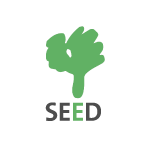“There’s nothing to do after school, and we want more activities to do. Especially soccer,” explained a teenage boy.
It was a cloudless Monday in chilly February with the sunshine filtering into a room accompanied by sounds of children playing outside. Six teenage boys sat in a neat circle on beige plastic chairs, some leaning back or with their legs crossed – wearing serious expressions occasionally punctuated by a shy smile. They had just finished the second day of SEED’s five-day psychosocial support (PSS) group focused on mental health and resilience, which is provided under the program funded by the US State Department Bureau of Population, Refugees, and Migration (PRM). The boys were eager to share their thoughts on camp life and experiences with SEED’s PSS programs.
“We sometimes hangout in the field but there’s too much trash and rocks to play.” The boys nodded in agreement and pointed out the windows at the overgrown field lying behind the newly-established SEED community center in Bersive I, a camp in the Kurdistan Region of Iraq. “We’d like to make new friends from other sectors in the camp, but it’s not easy to meet them. It’s good that we have activities like this,” another boy said.
SEED’s PSS activities are run through community centers open five days a week for women, men, girls, and boys. These activities offer a valuable safe space for young and old alike to gather and build stronger social support networks. Though most of the children and youth attend school, the school days typically only last a half day with students attending either morning or afternoon classes. The only extra-curricular activities for youth are typically limited to the NGOs operating in the camp, and the supply of activities are often dwarfed by demand.
SEED’s PSS activities, such as this group, are facilitated by a mixture of SEED staff, including psychologists, case managers, and community mobilizers, who act as a bridge to the community. Our goal is resilient individuals with the skills and the social support networks to deal with adversity and our PSS activities supports individuals’ recovery through strengthened emotional well-being, social connectedness, and coping skills.
As the conversation continued, the SEED case manager and community mobilizer running the group asked whether the boys had men in their lives they trusted and could rely on for support. Some of the boys nodded their heads saying that they had their brothers or fathers. One of the boys who had been sitting quietly with hands folded in his lap responded: “My father is no longer alive. It’s helpful and comforting to have men [like SEED staff] to talk to about life and learn from,” he said.
A few seconds of silence followed with nods of acknowledgment and empathy from the group. At the core of SEED’s PSS, are moments such as this, when the hours of relationship-building, conversations, and learning allow a moment of vulnerability, openness, and healing. The moment passed, the conversation came to an end, and the boys posed for the obligatory group photo before walking away laughing and chatting back to their homes, canvas tents in a displacement camp.
SEED remains continually committed to providing meaningful activities and the space where communities can gather to learn from and support each other.
Due to COVID 19 restrictions our in-person activities are currently paused, but we will be bringing you more stories of how we’ve adapted to working under COVID 19 and continuing our support to vulnerable communities.
This work was supported by our PRM program.
